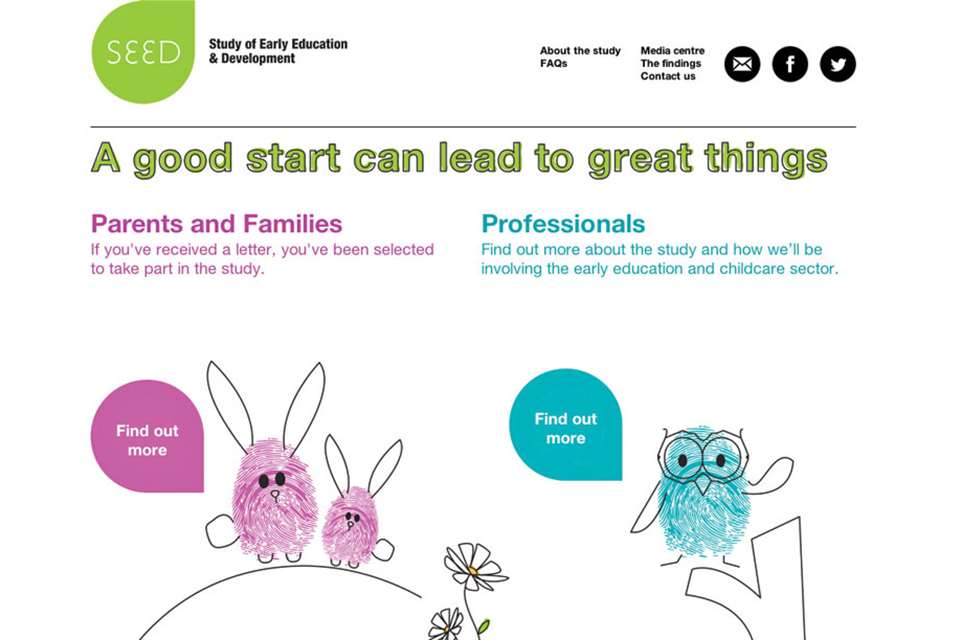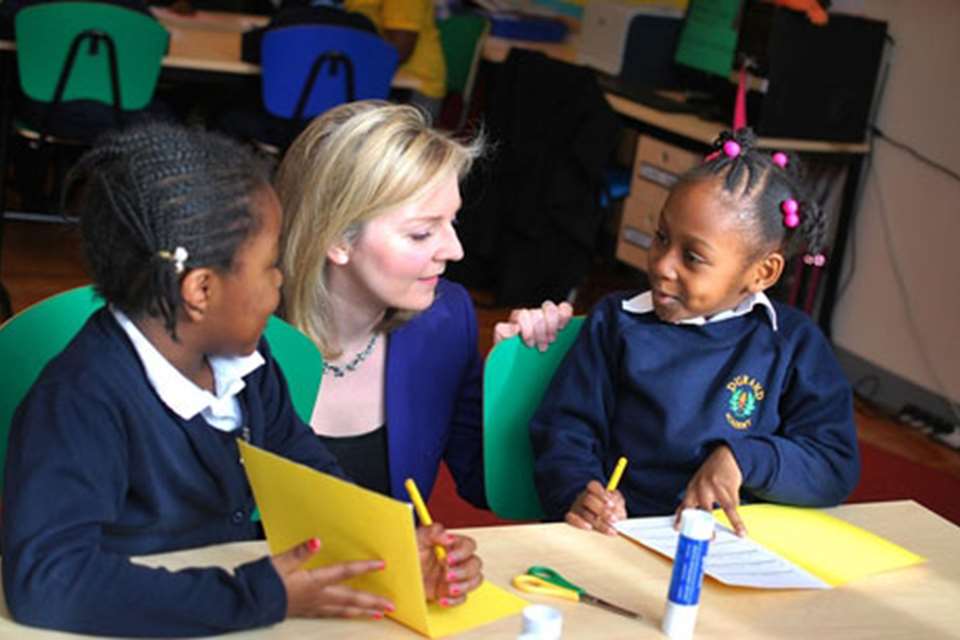Shortage of high-quality childcare places puts two-year-old scheme at risk
Wednesday, January 22, 2014
Further expansion of the programme for disadvantaged two-year-olds should be delayed until the Government can guarantee that all children will be given a place at a good early years setting, leading early years experts say.

In a new report, Sound Foundations, commissioned by the Sutton Trust, researchers from Oxford University argue that the scheme should be expanded to 30 per cent of twos by 2014, rather than the 40 per cent planned, because not enough early years providers are of a sufficient quality to provide the places.
This would relieve the pressure to find places and also allow the eligibility criteria to be tightened to allow only nurseries and childminders graded good or outstanding by Ofsted to provide the places.
The report argues that more than 20,000 early years workers will need to qualify as Level 3 (A Level equivalent) to bring them up to the standard required to provide good quality care.
Evidence shows that high-quality settings are needed in order for the poorest children to gain developmental benefits from early education, but the researchers say that there is already a shortage of high-quality provision for the current intake of 92,000 two-year-olds.
The report’s authors include the lead author Sandra Mathers, and Naomi Eisenstadt, former director of Sure Start and Kathy Sylva, professor of Educational Psychology at Oxford University.
Based on current trends many of the early years workers needed to expand the two-year-old places will be childminders, they say, but around four in ten of them do not hold a Level 3 qualification.
The researchers also recommend that pay should be improved to raise the status of early years workers and bring it in line with other countries. The report cites the Government’s own figures that childcare workers in England earn an average of £13,330 a year compared to £19,150 for an equivalent role in Germany.
Sir Peter Lampl, chair of the Sutton Trust and the Education Endowment Foundation, said, ‘Good quality early years provision is vital to narrow the gaps that leave too many youngsters behind by the time they start school.’
‘However, as our new research shows, it is vital that we get it right. In this tight funding environment the Government should focus the available resources on really good provision for the poorest children rather than spreading the money thinly by expanding the scheme too quickly. The Government’s policy of providing free places for the poorest two-year-olds should be a great investment in the future, but only if quality is not sacrificed for the sake of quantity.’
Professor Kathy Sylva, said, ‘Our report demonstrates how important it is to get early years care right. Research shows that good quality childcare can reduce behavioural problems and increase language skills among disadvantaged toddlers. However there is strong evidence that if the childcare is of poor quality there is no real benefit. We know that qualifications for childcare workers are important for quality therefore the Government should first invest in raising standards before expanding the number of free places available to two-year-olds.’
The London Early Years Foundation (LEYF) said the research was timely and backed the report’s recommendations.
'Slow down'
Chief executive June O’Sullivan said, ‘The Government should delay the introduction of funded care for disadvantaged two-year-olds. If it doesn’t, these young children will be forced in to schools too early – an environment that does not meet their needs and could do more harm than good.
‘Providing childcare on the cheap through schools is not a silver bullet to solve low attainment levels.
‘The Government should slow down and allow the places that have been created for the first tranche of two-year-olds to bed-in. It should only move forward when the right facilities are in place and childcarers who are currently training have achieved the relevant qualifications.’
She added, ‘The Government, childcare providers and all in the field agree that intervening early in a vulnerable child’s life is the best policy, and that the quality of intervention is of paramount importance.
‘Yet the Government seems set on pushing childcare providers into creating more and more capacity for vulnerable two-year-olds, without investing sufficient funding to deliver care of the quality these fragile toddlers require.’
However, 4Children argued against any delay to the two-year-old programme and urged the Government to extend the Pupil premium to the early years to fund the report’s recommendations.
Chief executive Anne Longfield said, ‘The extension of free early learning to 40 per cent of the country’s most disadvantaged two-year-olds from September 2014 has huge potential to improve the life chances of millions of children for years to come. That’s why we must prioritise rather than delay this crucial programme of work.
‘High quality is absolutely essential if we are to narrow the attainment gap between disadvantaged children and their peers. This will take serious additional investment to develop the workforce. 4Children believes that by extending the pupil premium to the early years, we can fund this vital agenda and ensure that the most disadvantaged children get the support they need to succeed in school and throughout life.’
Meanwhile Liz Bayram, chief executive of the Professional Association for Childcare and Early Years, said that the current childminder workforce was under-utilised.
‘Most good and outstanding childminders are still not accessing this funding, for a variety of different reasons, ‘ she said. ‘While some barriers have been removed, local authorities need to do more to appropriately fund and engage with childminders and other childcare providers. Slowing down the expansion of free provision for two year olds is one option, but PACEY believes that utilising the full capacity of the current workforce is a better first step.
She added, ‘Most childminders already hold a relevant Level 3 qualification, without any regulatory requirement to do so. So reaching the report’s target of an additional 20,000 practitioners having completed additional qualifications is a realistic goal. This can be achieved by Government investing in a workforce improvement strategy that not only looks to recruit more graduates into childcare but increases support for the current workforce to build their expertise.’
Neil Leitch, chief executive of the Pre-School Learning Alliance said that it was 'extremely disappointing' that the concerns raised by the report had not been addressed by the Department for Education sooner.
'The fact that a group of early years experts of this calibre feel that the only option is to delay the expansion of the scheme speaks volumes. This is a prime example of why the Government must fully engage with the early years sector before formulating and implementing new childcare policies, he said.'
Elizabeth Truss, education and childcare Minister, said, 'Driving up quality to give children the best educational start is one of my key priorities.
'It is encouraging that 77 per cent of early years providers are currently judged by Ofsted to be good or better, however I'm concerned that almost a quarter are not good and our reforms will help them to improve.
'We have been clear that any funding to help expand the service offered by nurseries should be directed to those rated as outstanding or good by Ofsted — something which I expect local authorities to be doing.
'We know that more than 90,000 two-year-olds are already benefitting from funded, early education and that nearly 90 per cent of providers delivering places are rated good or outstanding.
'However, we are also doing a number of things to raise quality which includes working with Ofsted to improve and strengthen the inspection regime, reforming qualifications for those who want a career in early years education and introducing Early Years Teachers.'
She added, 'I also want to see more schools nurseries offering places for two year olds. Almost 400 schools now offer funded nursery places for two-year-olds, and we are helping 50 schools trial places for two-year-olds in on-site nurseries. Of course the teaching must be age appropriate and as I saw at Oasis Academy Hadley - this can involve singing, story-telling and role-play.'
Comments from the early years sector
'Just because Ofsted regards a setting as good, doesn't mean it is – a 2012 Daycare Trust report found that there were "no significant associations between the grades awarded by Ofsted and quality for infants and toddlers." This underlines the need in relation for two-year-olds, in particular for local authorities to be assessing quality through regular contact with settings, and to ensure continuous quality development - not just relying on Ofsted alone.'
'We also agree on the importance of workforce development and the need for a realistic level of funding to enable the sector to support staff training and retain qualified staff, and urge Government to not to seek to expand provision faster than it can afford to fund adequately.
Dr Julian Grenier, chair of Early Education
'Nurseries are the ideal place for the early learning needs of two-year-olds to be met. Very young children need expert care.
'While it is crucial the learning two-year-olds are receiving is good quality, the majority of nurseries, 82 per cent, are graded good or outstanding but a shortfall in funding restricts wages and the number of well qualified staff a nursery can afford to employ.
'By increasing the funding nurseries can then work towards providing a proper career structure for early years staff with the pay and rewards well qualified staff expect and deserve.
'The report suggests creating a workforce development fund which we believe would be real boost to creating proper career paths within early years. As nurseries are providing funded places for two, three and four-year-olds they are also performing a public service and funding should reflect the need to reward well qualified staff.'
Purnima Tanuku, chief executive of the National Day Nurseries Association
'We welcome the report’s emphasis on the difference that good quality provision can make to the lives of children and families, and that this provision depends on the staff who provide it and their training, qualifications and experience.
'However, such research and its reporting must also highlight the low wages and lack of career and training opportunities endured by childcare professionals.
'Many nursery staff could earn more in less demanding low-skilled jobs outside childcare, but they are dedicated professionals who carry on providing a valuable service, at times even funding their own training.
'Without significant investment in training, salaries and a career structure for nursery staff, plans to expand childcare provision and raise standards will fail.'
Deborah Lawson, general secretary of the union Voice
'We would of course agree with the report’s argument that high-quality care provided in an age-appropriate environment is vital for two-year-olds, especially those from disadvantaged backgrounds who may have additional needs. Early years providers are already doing an excellent job in very challenging circumstances, and it’s important to remember that the vast majority of providers – both group settings and childminders – already provide "good" or "outstanding" care.
'However, the fact remains that if the Government continues to place extra demands on providers without providing the necessary support – both practical and financial – the scheme is in some serious difficulties.'








